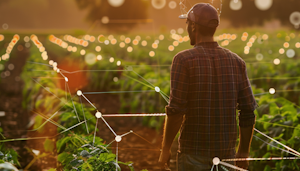 UseCasesFor.ai
UseCasesFor.ai
Choose Topic
 UseCasesFor.ai
UseCasesFor.ai
AI Use Cases
A collection of over 250 uses for artificial intelligence
A continually updated list exploring how different types of AI are used across various industries and AI disciplines,including generative AI use cases, banking AI use cases, AI use cases in healthcare, AI use cases in government, AI use cases in insurance, and more

Sign up
to receive a PDF containing all the use cases and stay updated with the latest AI trends and news (you can always unsubscribe)
Farm management suggestions

Introduction
Agriculture is one of the oldest industries in the world which has undergone several changes and developments over the years with the use of technology. From the use of manpower to the use of mechanisms and now to the use of digits and intelligence, the agriculture industry is at the brink of another major change – the AI revolution. One of the subcategories of AI, Gen AI is currently changing the face of the agricultural sector by offering smart management solutions to the farmers and helping them to meet the demands of the modern farming. This paper aims at discussing the use of Gen AI in giving farm management tips in the agriculture sector.
Challenges
There are several challenges that the agriculture industry is facing which Gen AI has the potential to solve and these include; labour shortage, impacts of climate change, water issues, pests and diseases, and the pressure of producing more food to meet the world’s ever increasing population. There is also the challenge of sustainable farming because there is rising demand for organic products which need particular attention. Also, farms can be vast and this makes it difficult to manage the whole farm efficiently. Also, the farmers are still unable to make data-based decisions because they either have no access to technical knowledge or there is no adequate and reliable data to be obtained.
AI Solutions
Gen AI offers several options in addressing these challenges. The use of machine learning algorithms and deep learning Generations AI is capable of processing large volumes of information and making estimations and recommendation for management. For example, it can forecast the weather conditions in order to assist the farmers on when to plant seeds or harvest their crops. The use of AI enabled drones can help in assessing the health of crops, the presence of diseases or pests and can even target the application of pesticides, thus minimizing the dependence on manpower. The other benefit is that Gen AI is also capable of assessing soil and crop information to offer tailored recommendations on water and nutrient management, and crop rotation. Further, AI can assist farmers in their decision making process by offering them information and analysis of the crop condition, expected yield and market prices. Blue River Technology and Farmbot are examples of companies using AI in this way.
Benefits
There are a lot of benefits of using Gen AI in farm management and the list is endless. AI can improve efficiency and output through the provision of tailored recommendations to farmers based on the analysis of data. It can assist farmers in the management of water and in the reduction of the use of pesticides through recommending specific water irrigation and pest control. It can also decrease the reliance on people to carry out certain tasks, which is very advantageous in the areas with a shortage of labor supply. With the provision of real-time information and analytics, AI can assist the farmers to make right decisions thus enhancing their profitability. Furthermore, it can suggest on the best practices of farming such as organic farming and crop rotation.
Return on Investment
It is possible to get a good return on investment (ROI) when implementing Gen AI in farm management. A study by Accenture states that AI has the potential of improving agricultural output by 10% thus translating to cost savings in the billions globally. The same report also reveals that AI can help cut water use by as much as 30% which would translate to huge cost savings. Also, AI can help reduce the dependence on manual labor and hence reduce the cost of labor for the farmers. The ROI, however, depends on several factors such as the size of the farm, the crop to be cultivated, the level of integration of AI, and the type of AI solutions adopted.